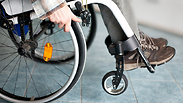
On a side street in east Jerusalem, down a steep flight of steps, a worker unlocks the door to a dusty warehouse. Dozens of wheelchairs and crutches are strewn haphazardly around a dusky room. It is the warehouse of the Arab Society for the Physically Handicapped, a small non-profit.
“There is a lack of services offered to physically disabled people in Jerusalem,” Akram Ali Okkeh, the general manager for the society told The Media Line. “We decided we needed to do something to help ourselves and our colleagues suffering from physical disabilities.”
Okkeh, who contracted polio as an infant, deftly wheels himself around the small office. He, along with a group of friends, started the organization in 1982, and began lending medical equipment five years later. A large Israeli organization, Yad Sarah, has a similar goal, but Okkeh said there is no cooperation between the two groups.
Related stories:
- Report: IDF seizes EU diplomats' West Bank aid supply
- Disabled Gaza baby lives in Israel hospital
- Elderly Arab shepherd attacked; settlers offer help
Salah Salaheddine came to the office to rent a wheelchair for his son who had fallen down a flight of steps and broken his leg.
“First I thought I’d have to buy a wheelchair and it was over $400,” he told The Media Line. “That’s too expensive for me. Then someone told me about this place, and that I could rent a wheelchair for just $30 for three months.”
After a few minutes, he walked out with a wheelchair.
“They didn’t ask me for any collateral at all,” he marveled. “I like this place.”
Okkeh said that needy Palestinians are given the equipment free. Those who have a long-term need for a wheelchair can buy one at a discounted price. Most common are the short-term rentals.
Since most of the clients are Palestinian residents of east Jerusalem, they are covered by Israeli HMOs. Most residents of east Jerusalem are not citizens but they receive the same social services as Jewish residents. However, east Jerusalem, which Israel acquired in 1967 and later annexed, is far less accessible than the rest of the city.
“There are no ramps and no places for parking,” Okkeh said. “I have a special car with a lift, and I had to argue with the city for months to get financial assistance to buy it. The city should do more to make our part of the city accessible.”
At least three percent of the Palestinian population are disabled, he said, both because of birth defects and injuries sustained during the first and second intifada, the Palestinian uprisings against Israel. In his case, he was born while Jordan controlled east Jerusalem, and before the polio vaccine was widespread.
Ironically, Israel just finished a campaign to vaccinate one million children under age 10 with the oral polio vaccine after polio was found in sewage in several areas. The Israeli health ministry said the campaign had been successful.
The Arab Society for Rehabilitation runs on a shoestring budget of $30,000 per year, and with just three full-time employees. Beyond lending medical equipment they hope to launch a campaign for more accessibility in east Jerusalem.
In the West Bank, the situation is even more problematic. Few schools are accessible, and children with disabilities often end up denied an education. Maysoon Zayid, a Palestinian-American actress and comedienne, has been active in raising money to build special playgrounds for disabled children.
“I started Maysoon’s Kids after seeing images of the destruction of Jenin and Nablus during the second intifada,” she told The Media Line. “I worried that a whole new generation of kids with disabilities was being created in a society that already faces challenges integrating and saving them.”
Zayid herself has cerebral palsy (CP) and travels often to the West Bank.
“I think it’s crucial for the community to see a functional disabled adult,” she said. “I also do standup comedy while I’m there to help humanize disabilities and to dispel stereotypes while making them laugh.”
Zayid has just started a pilot classroom in the West Bank town of Beit Fajjar for children with disabilities. She says that Palestinian society still stigmatizes the “differently-abled.”
“The disabled community faces an uphill battle,” she said “The biggest challenge is convincing society that physical disability does not equal an ability to learn. It breaks my heart to see teens with CP who can't read write or speak because no one even tried to teach them. I don't blame the families -- the ones I've worked are desperate to give their children the best future policy but they don't have the means, support or freedom to do so.”
She says Israel’s restrictions on freedom of movement make it difficult for disabled children to access the limited rehabilitation services in the West Bank. Few Palestinian families can afford the special transportation needed for wheelchairs.
“Even when a center has a van, they often lack the funds to keep it fueled,” she said. “The Palestinian Authority needs to subsidize this to ensure every child’s right to an education.”
Article by Linda Gradstein
Reprinted with permission from The Media Line















